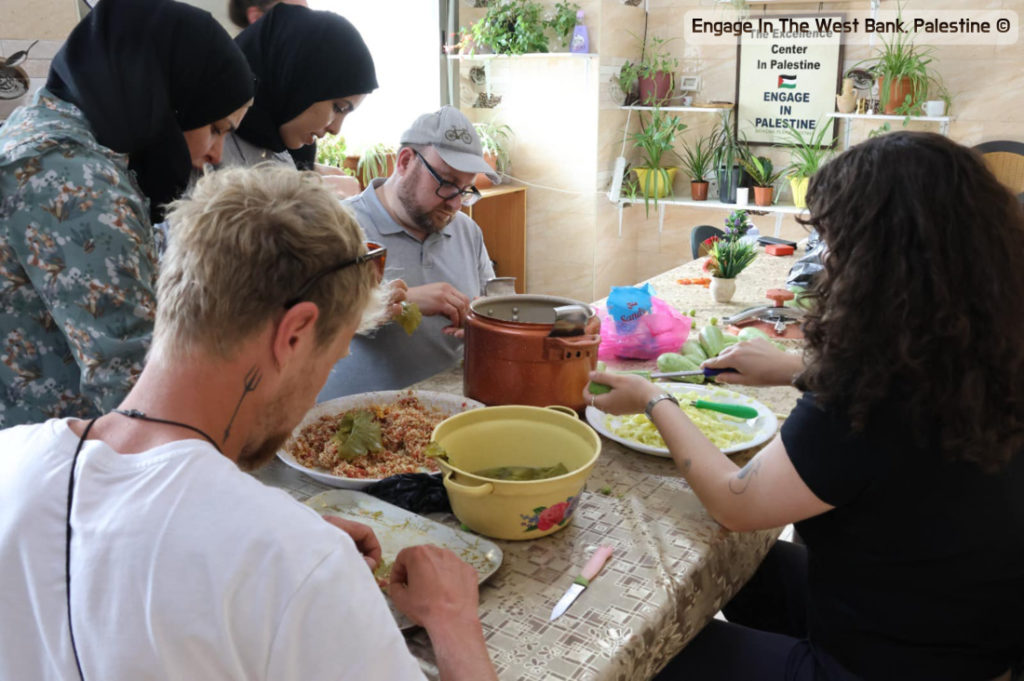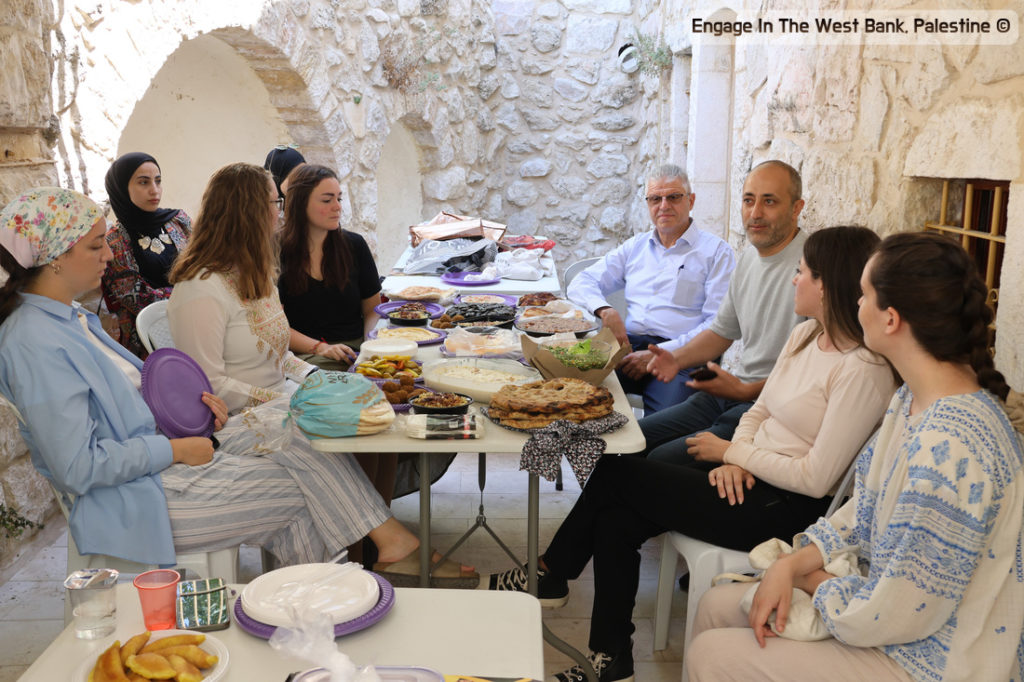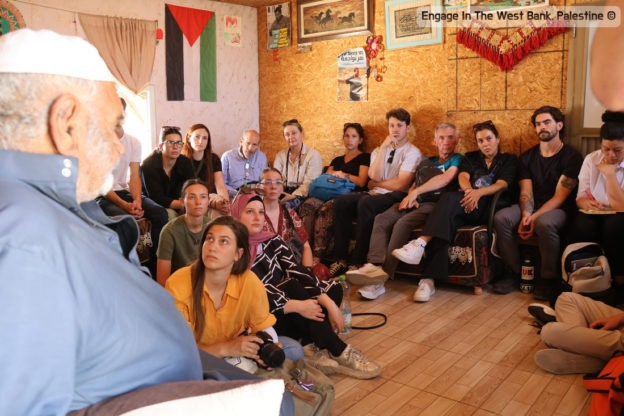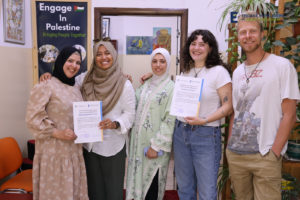Stay with a Palestinian Host Family: All those selected for the Engage in the West Bank, Palestine volunteering program, TESA, and study Arabic programs as well as international visitors will have the chance to live with a host family in Palestine during their time with the Engage in the West Bank, Palestine.
Homestays are subject to availability for male volunteers, students, interns, and visitors, so we recommend applying to the program of your choice as early as possible to secure your reservation in the homestay placement.
How are Engage in the West Bank, Palestine host families selected?
Engage in the West Bank, Palestine families are fully interviewed and vetted before being taken on by the Center, and most have been working with us for years, gaining experience along the way. As such, they will be aware of cultural differences and potential points of awkwardness, as well as matters and information you’ll likely need help with.
Even very experienced families, however, will still have things to learn, If you engage your new living community with patience and respect, you and your host family should gain a lot from each other.


What are the advantages of living with a Palestinian host family?
The prospect of living with a group of people you don’t know, and who mostly don’t speak your language can be daunting. However, it’s well worth overcoming some inevitable awkwardness and shyness for the advantages that await.
A host family, for instance, offers a brilliant resource for learning the culture firsthand and gaining the most from the oft-cited Palestinian hospitality. There will be plenty of opportunities to attend traditional wedding ceremonies and other events with a host family, especially on Fridays, when families usually welcome large gatherings and cook traditional food.
Living with a host family also provides the most efficient way of learning the language. While most families do speak some English, you can expect the majority of conversation to be held in the Palestinian dialect.
Families with small children are particularly helpful in this respect, since the vocabulary of young children is simpler, and their pronunciation is often being corrected by their parents. Parents will also often be delighted for you to help out with children’s English homework, providing a chance to practice simple translation.
Should I have any concerns about living in a host family?
Many people who come to Hebron to live with Palestinian host families haven’t lived with a family in years. Usually, the people who join a host family are used to a certain level of independence, Living with a host family in Palestine, you should expect to be treated as one of the family, but this also places on you some of the responsibility of behaving like one of the family.
Palestinian host families are delighted to welcome internationals and to share knowledge of the local culture. But it’s up to the individual to engage and reciprocate the hospitality.
What should I know about living with a Palestinian host family?
Experiences with host families are as varied as each Palestinian family itself, whether you’re living with an elderly couple or a family of five with toddling twins. However, there are a few simple rules about living with a host family that, when kept in mind, can help you avoid any miscommunication and potential misunderstanding.
A few tips
Below are a few tips to help better your stay with your Palestinian host family:
Eating the same food as the host family
Although Engage in the West Bank, Palestine host families are not obliged to provide meals, most families enjoy offering food in the evenings, and on weekends. You should expect to eat what your host family is eating for dinner, and, unless you have particular dietary restrictions, it can be considered rude to refuse.
If you find that your host family expects to provide food for you in the evenings, make sure you let them know if you’ll be eating out.
Positive insistence
A culture of hospitality in Palestine means that hosts tend to feed their guests a lot, and if you’re not used to eating large meals, host families’ insistence that you eat, or drink copious amounts of tea and coffee may come as something of a shock.
Telling your host family ‘Alhamdulillah’, the food was excellent, but you’re full, is very acceptable and you shouldn’t feel trapped into stuffing yourself. Offering food and drinks is a way of making you feel welcome as part of the family.
Dietary requirements
The vast majority of Palestinians eat meat, and the very few people who are vegetarians tend to do so on a doctor’s advice, rather than as a matter of choice.
However, most host families have no problem in accommodating you as a vegetarian or vegan if they’re informed at the beginning of the stay of your needs. Make sure, as a vegetarian, that you make clear that you eat neither fish nor meat, as vegetarianism is often assumed to include fish. If your host family doesn’t fully understand your dietary requirements, don’t be shy in politely refusing foods you cannot eat.
Palestinian generosity
Many people who have lived in a Palestinian homestay feel obliged to give back to their generous hosts. However, hospitality is an important part of Palestinian culture and host families will be as generous as they can with their guests. The more generous you can be with your guests, as a Palestinian, the more appreciated you are from the perspective of the community.
Respect the house rules
Living with a Palestinian host family, you should get an idea of the house rules quickly. Don’t be afraid to ask if you’re unsure of anything, whether it be questions about meal times, use of the washing machine, or the time you’re expected to be back at home for the night.
Make sure you have the contact details of at least one member of your host family so that you can let them know of any changes to your schedule. Whether they have agreed to allow you to bring a friend for coffee, or dinner, or whether you’re coming home later than expected, it’s important to let them know as far in advance as possible.
For women, you must inform your family if you’re returning home late, as they’re likely to worry about your safety.
Events and gatherings
Expect, as a member of a host family, to be invited to gatherings and celebratory occasions and ceremonies with your family. On Fridays in particular, Palestinians tend to host big lunches with their extended family, often cooking chicken Maklouba or other traditional dishes.
Dress appropriately
Hebron is a religious, conservative city, and you must respect the requirement to wear long sleeves and long skirts or trousers year-round. In place of pajamas, Palestinians tend to wear a tracksuit or a onesie, and it’s a good idea to follow this lead. In any case, you should avoid the temptation to run to the bathroom in a silk nightgown.

